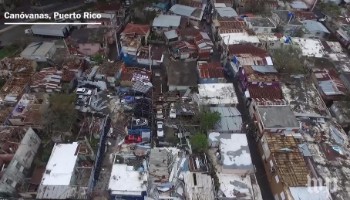
Puerto Rico needs “all hands on deck” as it struggles to recover from “the perfect storm” created by damages from hurricanes Irma and Maria in the island nation, its Gov. Ricardo Rossello said on MSNBC’s “Morning Joe.” (Screen capture from MSNBC)
ALPHARETTA, Ga—After Hurricane Maria knocked power out for nearly the entire population of Puerto Rico, the island’s infrastructure is devastated and initial reports estimate that it will take months before services can be completely restored.
On Thursday afternoon, Sept. 21, FEMA officials sought to organize a response in Puerto Rico with Southern Baptist Disaster Relief as well as American Red Cross and the Salvation Army.
Sam Porter, the North American Mission Board’s national director for disas-ter relief, worked with state SBDR leaders to mobilize their response.
“At 3 p.m. yesterday (Sept. 21), FEMA asked us to get a plan together to send teams to Puerto Rico to start serving 200,000 meals daily,” Porter said. “By 6 p.m., we had kitchens capable of feeding 100,000 meals a day committed to be driven to Florida, packed onto boats and shipped to Puerto Rico.”
NAMB and SBDR continued coordinating throughout Friday, Sept. 22, to send the necessary teams to Puerto Rico. The goal is to have feeding units in transit to Puerto Rico from Florida on Monday, Sept. 25.
When Irma smashed through the Atlantic and the Caribbean a week and a half ago, the damage sustained in Puerto Rico was severe, but the island avoided a direct hit.
An SBDR kitchen from Alabama had been diverted from Puerto Rico to the U.S. Virgin Islands at the request of officials because of the damage sustained there. That unit (along with another) will be serving 5,000 meals a day in the Virgin Islands.
“The whole world is watching what’s happening with these historic storms,” Porter said. “Our response will tell Puerto Rico and the Virgin Islands that Southern Baptists care about you.”
The goal, Porter said, is to have between six and 10 kitchens sent to Puerto Rico and it will take between 200 and 300 volunteers to operate the kitchens and serve the needed meals.
Porter said volunteer fatigue is a significant concern right now.
“This is week five of responding since Harvey made landfall,” Porter noted. “A lot of our teams are tired and weary. We really need more Southern Baptists to step up in a big way in the next month.”
Porter urged volunteers to go and serve, especially if they have disaster relief training. Those without training are also welcome.
“If you don’t have training, that’s a big part of what (NAMB’s) Send Relief is for,” he said. “Southern Baptists have ways for everyone to get involved in this huge response.”
NAMB’s vice president of Send Relief, David Melber, also added, “Another part of our approach is to provide support packages to our Baptist churches in the U.S. Virgin Islands and Puerto Rico. We will also be putting together support packages for their pastors.”
Those support packages will include: generators, food, water, financial resources and other items as needs continue to be made known.
“Our desire is to affirm the position of the local church in all the response areas,” Melber said. “Our goal is to get the local church positioned to be the pillar in the community. We also want to make sure local pastors are supported and empowered to lead their churches.”
Southern Baptists have been striving to get as many resources as possible into ar-eas affected by these disasters.
In their Sept. 18-19 meeting in Nashville, the SBC Executive Committee voted to send the first $1.25 million in overages to the Cooperative Program Allocation Budget to NAMB’s Send Relief ministry. In addition, the SBC Executive Committee will send its income overages toward International Mission Board disaster relief initiatives. (BP)
Brandon Elrod